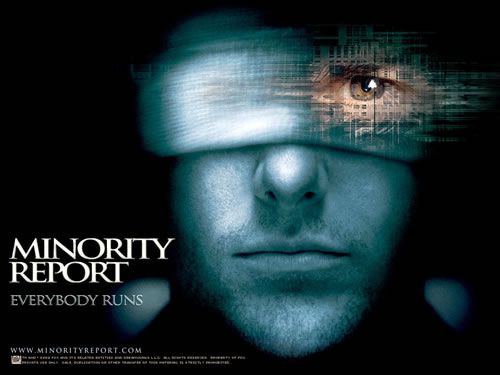

When I watched the movie “Minority Report”, I was scared to death on the prospect of robot-police entering the bedrooms of people for taking their IRIS scans to catch an alleged criminal not because I am a criminal but because I don’t trust the State, especially the Police. But, it was just a movie, and its chances of turning into reality were remote in India…but, not really! The scary movie has already turned real in India, and there is no Hero in this movie, albeit there are plenty of villains.
The name of the villain/s will vary from person-to-person depending upon thier own discernment of facts. Nevertheless, I suggest the following names:
1) Mr Manmohan Singh, the Prime Minister.
2) Mr. P Chidambaram, the Home Minister.
3) Mr. Pranab Mukherjee, the Finance Minister.
4) Mr. Nandan Nilekani, the UIDAI chief and ex-CEO, Infosys.
5) Mr. Montek Singh Ahluwalia, the Planning Commission’s Deputy Chairman.
6) Mr. L. K. Advani, the Home Minister of the NDA government in the year 2003-04.
7) Mr. Atal Bihari Vajpayee, the Prime Minister of the NDA government in the year 2003-04.
I will just state the facts and leave it for the readers to chose their villain/s.
Minority Report – the FACTS (AADHAR)
The movie started in 2004 when the politicians of this country, at the time of the NDA government, amended the Indian Citizenship Act by inserting Sec 14A, which made it mandatory for every citizen of India to register for National Register of Indian Citizen (NRIC) by providing his or her personal information. Sec 17 of the Act was also amended increasing the punishment for providing wrong information from six months to five years. No clues were provided in the Act as to what all will be collected for the registration. The amending act is available at http://www.legalindia.in/the-citizenship-amendment-act-2003. At the same time, the Registrar General, India, who is under Home Ministry, was also made the National Registration Authority. Subsequently, a division was created under him for collecting data of the usual residents of India to be entered in the National Population Register (NPR), which data is to be used eventually for preparing the NRIC. As per the Citizenship (Registration of Citizens and Issue of National Identity Cards) Rules, 2003, available at http://mha.nic.in/pdfs/citizenship_rules2003.pdf, the following information will form part of the NRIC:
(i) Name
(ii) Father’s name
(iii) Mother’s name
(iv) Sex
(v) Date of birth
(vi) Place of birth
(vii) Residential address (present and permanent)
(viii) Marital status – if ever married, name of the spouse
(ix) Visible identification mark
(x) Date of registration of Citizen
(xi) Serial number of registration
(xii) National Identity Number
In the year 2011, a door-to-door enumeration was carried out, in which 15 personal details were collected. At the same time, Mr Nandan Nilekani started collection of biometric information of the usual residents including IRIS scans for the purpose of issuing AADHAR cards. As per the National Identification Authority of India Bill, available at http://www.prsindia.org/billtrack/the-national-identification-authority-of-india-bill-2010-1196/, the collection of information is not mandatory, and a resident may opt out of AADHAR registration; but, as per Mr. Nilekani in one of his interviews, the service providers like banks may make the mentioning of AADHAR numbers necessary for availing their services; the bill is still pending, and the collection of information till now is on the basis of a Cabinet nod. How exactly? I don’t know.
The Home Ministry, led by Mr. Chidambaram, raised concern about the information to be collected by Mr. Nilekani and recommended collection of biometric information under the NPR only. From time-to-time, I have been visiting the FAQ section of the NPR website at http://ditnpr.nic.in/FAQs.aspx and also other relevant portals, and, as per my knowledge, the biometric information was not to form part of the NPR earlier. Also, the same is not necessary as the information forming part of the NRIC (mentioned above) doesn’t include the biometric information. However, my recent visit to the NPR website leaves me bewildered as the biometric information now forms part of the NPR to be collected compulsorily by the Home Ministry.
As per the news reports (http://ibnlive.in.com/news/uid-nilekani-pc-reach-compromise-deal/224773-3.html ), a compromise has been reached between the Home Ministry and Mr. Nilekani, as per which “he NPR will continue to capture biometric data, but if a person says he/she has taken an Aadhar number, no biometric data will then be collected by the NPR.” However, the collection of biometric data would remain compulsory; those who don’t get covered by the UIDAI shall be covered by the Home Ministry; and, it seems, it shall be ensured that the failure to provide biometric data would carry a punishment of five years u/s. 17 of the Citizenship Act, 1955.
Now the readers may make their own conclusions; however, I will offer the following hint: The villain is not always the one who appears to be so; in a conspiracy, it is always very difficult to identify the master-mind, and guesses have to be made.
India has now become the worst country of the world. The residents have to compulsory divulge their biometric data to even live here. People need to learn running because, eventually, they will have to run away from this country.
(This post was originally published in the year 2012 on another of my blog detailing the planning stage of comprehensive surveillance through AADHAR. It has been republished because of its renewed relevance now.)
© 2012-2017 Ankur Mutreja
Featured Image Credit: Carlos Guadian (https://www.flickr.com/photos/k-government/63651822)
Click to Post

